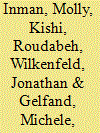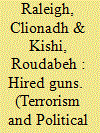| Srl | Item |
| 1 |
ID:
132324


|
|
|
|
|
| Publication |
2014.
|
| Summary/Abstract |
In order to assess the impact of culture on state behavior in international crises, specifically with regard to mediation and its outcome, this study tests hypotheses rooted in both the international relations and the cross-cultural psychology literatures, implementing analysis at both the international-system level and the domestic-state-actor level. At the international system level, the study finds that cultural difference between adversaries affects whether or not mediation occurs during an international crisis but has no effect on tension reduction. At the domestic state actor level, we find that there are certain facets of cultural identity that make a state more or less open to requesting or accepting third-party mediation during an international crisis, but that these facets have no effect on tension reduction.
|
|
|
|
|
|
|
|
|
|
|
|
|
|
|
|
| 2 |
ID:
172192


|
|
|
|
|
| Summary/Abstract |
Pro-government militias (PGMs) are armed, political organizations that assist regime and state elites through illicit violence. This article considers how and where to situate militias within larger frameworks of political violence and its emerging contexts. Pro-government militias have increased in recent years, along with their participation in conflict events, including those resulting in fatalities. This is in step with increases in domestic political competition and regime fragmentation across developing states. Using a new PGM dataset that collects discrete events perpetrated by these groups across Africa from 1997–2016, two conclusions are reached: PGM groups are more active outside of civil war periods than within, and their actions and numbers have increased as more countries transition to democracy. Further, activity by PGMs is not well explained by government attempts to delegate violence for reputational reasons or low capacity. Political fragmentation at the national level and diffuse opposition threats better account for the spatial and temporal patterns of PGM activity.
|
|
|
|
|
|
|
|
|
|
|
|
|
|
|
|